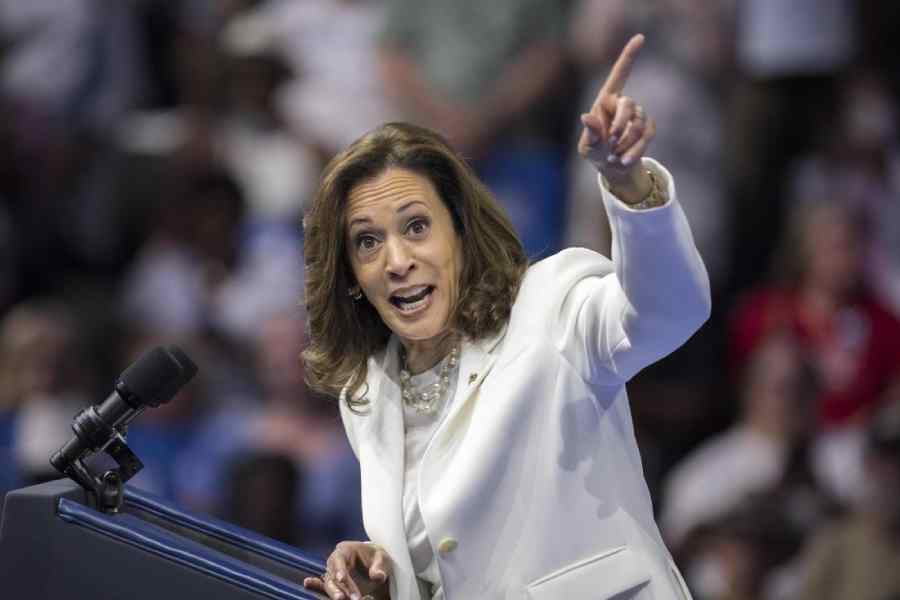I remember my female American friends being visibly excited by the prospect of a woman becoming the president of the United States of America for the first time ever during the 2016 US presidential elections. Many of them came from the conservative south and mid-west and were living in the more liberal city of New York.
A female president has eluded the US since George Washington became the first president of the country in 1789. But recent US history has not been short of illustrious female names in the polity whose roles have been consequential, particularly in world affairs. The roles of the then secretary of state, Madeleine Albright, from the Democratic Party in the late 1990s and Condoleezza Rice from the Republican Party, particularly in the post 9/11 era, come to mind. But the post of president has eluded a woman. This is ironical given the fact that patriarchal South Asia has seen a number of female heads of government. The Western world, too, has had a number of female heads of government who made a transformative impact, namely Prime Minister Margaret Thatcher of the United Kingdom and the German chancellor, Angela Markel. The first substantive female presidential bid in the US came as a result of Hillary Clinton’s nomination by the Democratic Party as late as 2016.
In this context, eight years after the 2016 presidential elections, the headlines and the commentary that have marked the ascension of the vice-president, Kamala Harris, to the Democratic Party ticket in the 2024 presidential polls are largely bereft of the ‘shattering the glass ceiling’ narrative. Harris is being seen as the best available winnable mainstream candidate to represent the Democratic Party ticket. And the way Harris made a seamless and aggressive transition indicates that she and her camp were eagerly expecting this opportunity. One must thus understand the present context and also her journey.
Harris’s nomination comes in the midst of continuing tumult that the US is experiencing, with a deep-seated polarisation mainly between the poorer white segments in the hinterland and a more heterogeneous group of population around the wealthier coastal areas. Looking back, the former secretary of state, Hillary Clinton, won the absolute votes but lost because of the electoral college which gave disproportionate weight to smaller swing states and red states. Though Hillary Clinton made a sales pitch concerning the possibility of America electing its ‘first female president’, it got diluted because of the baggage of her husband, Bill Clinton. Harris, on the other hand, comes with no such baggage. Accepting and recognising diversity have become a political necessity as the country in the last eight years has progressed further closer to the date of it becoming a nation with a non-white majority. Harris is unlikely to don only one identity; her biracial inheritance brings an advantage.
The young and the black voters are undoubtedly galvanised; this was not the case with President Joe Biden’s re-election bid.
Harris is also keen to appeal to the fence-sitters, particularly the blue-collared, Christian, white population, in the swing states who have their own priorities, such as the issue of law and order. The female vote in these states may not be entirely swayed by the slogan of ‘first female president’. That is why her professional experience in California may be selectively amplified in these states. She was elected district-attorney of San Francisco, the first woman and the first person of colour to hold that position. In 2011, she became attorney-general of California. A profile in 2019 in The New Yorker profile on Harris noted that “the criticism of Harris’s past is two-fold: that as an enforcer she was excessively punitive, and as a reformer she was too slow.”
Promoting legal migration and an aggressive stance on abortion summarise some of the key aspects of Harris’s poll blueprint. Over the last eight years, abortion as an issue has progressively gained traction beyond the traditional Democratic base. One of the issues that got Donald Trump votes in 2016 in some of the key swing states was his opposition to the mass influx of illegal migrants as well as his rhetorical positions, such as erecting a wall along the southern border. On August 24, The New York Times reported that “the number of people asking for safe haven in the United States has dropped by 50 percent since June, according to new figures from the Department of Homeland Security.” While there is criticism by many civil rights groups that the ruling Democratic Party’s current stance on border crossings is a contravention of American values, Harris’s de-facto thrust on legal migration may benefit the Indian diaspora. These migrants are at a disadvantage as there is a stipulation of a 7% quota for each country to acquire permanent residency rights which is the first step to acquiring American citizenship. A majority of the Indian diaspora living in the US are not its citizens. In fact, approximately 44% arrived in 2010 or later.
A key domestic impediment that Harris faces is the electorally significant Arab-Muslim population residing in swing states like Michigan. The Arab diaspora feels let down by what is perceived to be the pro-Israel stance of the Biden administration in the Hamas-Israel conflict. The next two months will reveal her capability of getting back that support.
An overall combination of changing demographics, where diversity has become even more mainstream, the alignment of her stances on abortion and immigration with the majority of the population in the swing states, and the overall success of the Biden-appointed managerial team in managing the domestic economy brings heft to Harris’s campaign. The context and the journey that the country has traversed in the last eight years explain the reason for Harris being the most perfect available candidate for the Democratic Party’s presidential candidature. Her being the potential first female US president is only one among the many variables that constitute her appeal.
Luv Puri has worked on peace and security issues for two decades, including at the UNHQ










